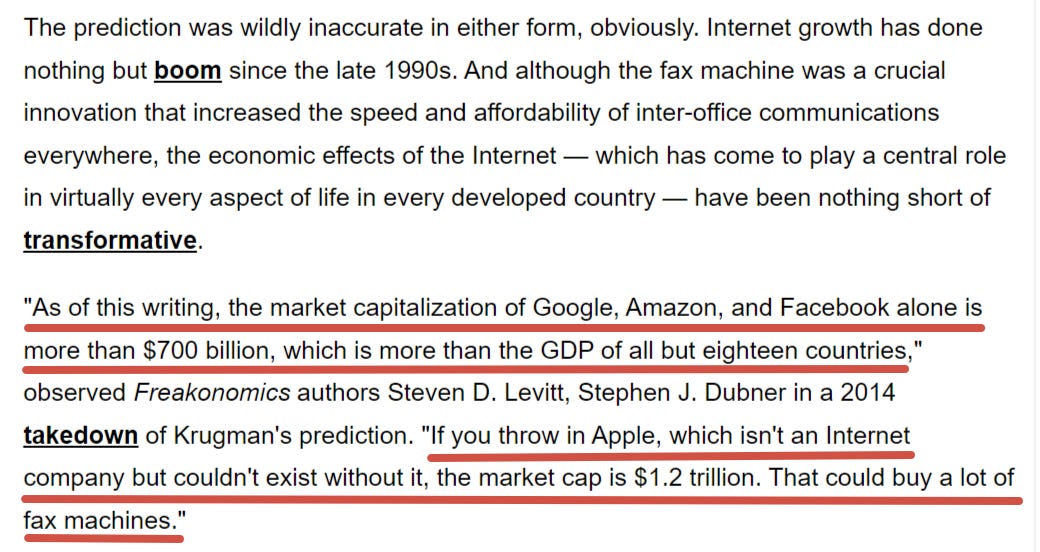The Essence in Apple's VR Flop
The Essence in Apple's VR Flop
A few people have pointed out that the much-vaunted Apple Vision Pro—meant to be the savior of AR/VR and usher in the paradigm-shifting cyberpunk age—has in fact unexpectedly, kind of, sort of, regrettably…flopped.
Okay, so there’s actually a debate on that fine point. Rumors claimed the device has sold 200,000 units, which is supposedly impressive. However, others claim most of those were presales, and since release things have stalled. In fact, nearly half of those early buyers now reportedly plan to return the headset, citing various problems:
Don’t worry—this isn’t meant to be a pedantic tech review. But to dispense with the preliminaries, let’s just acknowledge that the Apple Vision Pro costs a whopping $3,500 for its very lowest base price. For the highest end 1tb storage models, after taxes, and other recommended or quality of life accessories, it can actually top out at just under $5,000. This alone precludes the vast majority of people from even considering the purchase. Has Tim Cook even bothered to take a peek at society lately? I know the Cupertino tech-grandees stash themselves away in their palmy enclaves, but surely they have some kind of consultants to at least occasionally gauge the temp of the sweltered toilers beneath the clouds. It wasn’t many decades ago you could buy a new car for the price of these ugly ski goggles, and Apple seems to actually believe the Fed’s cooked—no pun intended—per capita income numbers.
Is the disconnect between tech elite and the common rabble widening to that degree? Who in their right mind thought this would become a staple fashion accessory?
That strikes to the heart of the point. The potential failure of the Vision Pro—like the Segway and Google Glass boondoggles before it—epitomizes a fracturing divergence of metaphysics between the common salts of the earth and the techno-transhumanist-executive class.
The Forking Road
Some might balk: there he goes with those fancy philosophisms again. But I use the term metaphysics very deliberately in this case, to denote that the elite are beginning to diverge from the rest of humanity in the most fundamental sense: at the reality-conceptual level.
In the world of the elites, the dogma of the day is absent growth and perpetual steered progress, on which I enlarged here:
It’s followed by the haute monde of the technobrats like a blind faith. The reason is simple: it gives them a basic rubric for success and fulfillment, in the absence of any true meaning or spiritual depth—which they all undeniably lack. It gives life a factitious arrow to follow amenable to left-brained valuations of the world. To wit: if you can draw it elegantly on a chart, with the sloping line showing upward growth, then it is Good and all is well with the world; a sense of fulfillment, substantiation, and validation all in one.
In simpler terms, it makes techbros believe they are doing the right thing: improving the world. It makes them feel important and needed. It makes them feel good about themselves in that grandly Nietzschean post-Christian lacuna we inhabit. No thought is given to the actual deeper, second order implications of their techno-constructs: as long as they can chart an upward movement and growing figures, the reward of self-satisfaction follows. It is the immortal faith of the Cult of Progress.
This progress has an inbuilt inertia which fills the low-intelligence techno-elite with a new giddiness as each peg of acceleration is passed. The near-infantile monkey-clap at the superficial ‘progress’ translates into growing obliviousness for the true metaphysics of human nature. With each new ‘exciting’ breakthrough, they grow prouder, self-validation thrumming like jackscrews in some incomprehensible machine. It becomes addictive: more, more, more—and ever faster. There is no inherent teleology beyond the vaguely narcissistic abstraction of the Utopia of Endless Abundance. Just pile up enough of these thingamajigs and technobabbles and we’ll all be immortal saints basking in jouissance.
I’ve usually written about future tech developments with a cautiously optimistic tint, at least in terms of the adoption or maturation of the current vogue technologies, be they VR/AR, AI, etc. But in the spirit of contrarianism, here’s a brief manifesto on why there’s also a good chance that this tech will be rejected by society, ultimately springing not from civilizational nirvana, but indifference.
The Enigma of Krugman’s Pendulum
In 1998, economist Paul Krugman famously gave his much-lampooned prediction, which I dub Krugman’s Pendulum:
“The growth of the Internet will slow drastically, as the flaw in ‘Metcalfe’s law' becomes apparent: most people have nothing to say to each other! By 2005, it will become clear that the Internet’s impact on the economy has been no greater than the fax machine’s”
As is always the case with internet discourse—which in some ways alone redeems the above—things are diluted, generalized, or outright deliberately misrepresented to push whatever confirmation-biased agenda one desires. In this case, the backlash reductively glommed onto the part of the statement which says, in essence, that the internet will not have a great impact [on the economy].
While in the ecstatic early throes of the internet bubble years the prediction looked increasingly ludicrous, the closer to now we’ve gotten, the more people have begun to have second thoughts. Firstly, we can now definitively say that the internet had a deleterious effect by uprooting local economies, selling them out to the hungry corporate vultures of globalism. This unleashed a boomerang effect that ultimately bought a few inflated years of cheap goods while gutting our foundation and cheapening our quality of life.
It can be argued that beyond making corporations richer, Krugman’s prediction was accurate in foretelling that the internet would not have any real economic benefit for the common man. Isn’t it interesting that critics of the prediction choose to evaluate it using the denominator of Wall Street and big business? By the measures of Dow Jones and Nasdaq averages, one would think the economy has done nothing but boom thanks to the internet. But the average Joe is little connected to the stock market, and has received few real benefits from it.
For instance, the below Snopes article absurdly uses the total market cap of Apple, Google, and co., as an indication of Krugman’s blunder:
The implication is that the inordinate riches amassed by these corporations, as facilitated by the internet boom, have somehow made society, humanity, or the economy in general better. In reality, the common man’s living standards are totally disconnected from Apple’s valuation—and could even be said to be inversely proportional: as the big corps have grown richer, we’ve all clearly grown the poorer for it; the corporate consolidation era has done nothing but increase cartelization, hurting competition and destroying local economies.
Did the internet really change the way humans live? Beyond the superficial motions of vegging out at smartphone screens, scrolling through waterfalls of vapid content, it can be argued the internet had marginal real effect on daily life. It merely served as a sort of flimsier, watered-down surrogate for other things; inaccuracy-filled, low-effort websites as replacements for well-crafted physically published content, and so on. It’s provided the convenience of doing certain things faster: buying movie tickets online instead of at the theater. But does that really change anything at the fundamental level in human activity?
In many ways life is nearly indistinguishable from thirty years ago: people still go through the same motions; they go to work, come home, and maybe instead of watching TV, they now scroll their phone or glaze away at Netflix. Instead of shopping at the big box store, they may choose to order from Amazon. The internet can unironically be argued to have changed next to nothing, and in fact, even the few superficial changes it stimulated are arguably regressing, particularly as people abandon social networks and increasingly seek a way out of the digital panopticon.
That’s the next point: in their glee in trampling the prediction, the faithless apostles have completely ignored the most remarkable part of it:
“The growth of the internet will slow drastically…most people have nothing to say to each other!”
And here’s the rub, which gets down to our discussion of metaphysics.
Techgurus ignore the basic evolutionary human-biological impetus—they assume their own warped telos to the human condition, one that meets their confirmation bias criteria. It’s a form of wishful thinking: they want humans to be a ‘certain way’ because that ‘way’ happens to coincide with a world—or reality—that fits the techgurus’ Utopian ideal—primarily one where they’re lauded and richly rewarded for their ‘contributions’ to humanity.
Much of modernity’s tech developments do not in any way fill the most basic, essential, or fundamental human needs—the impetus I spoke of. The misconceptions stem from the same Cult of Progress disciples who use the misleading electricity disparity photo of North and South Korea from space as a definitive rubric of ‘Progress’; it is empty progress without meaning.
Similarly, techgurus simply assume that since VR devices like the Apple Vision Pro are a technological marvel or leap forward, that these gadgets innately possess some form of human evolutionary validation; the product is Good because it is Innovative. Ergo it must objectively be a naturally ordained evolution of our societal fabric—no questions asked.
But such people overestimate the essentiality of their doodads. Each time such gadgets have failed, a built-in excuse always chalks it up to some unforeseen issue, ‘undoubtedly’ to be corrected in future iterations. The failure is never attributed to the techgurus’ total misapprehension of human needs and values. For example: they’re now saying the VR Pro was ‘over-engineered’ because it was Apple’s first foray into this technology, and they needed to hook people with an impressive launch. Future iterations will likely scale back on some of the unnecessaries, making the unit not only less expensive but more attractive in general. This is a quintessential lack of self-awareness.
What if I were to tell you that no such alterations can save these products? What if unbeknownst even to himself, Krugman’s prediction uncovered the seed of some hidden truism of life?
“People have nothing to say to each other!”
Let those words echo through you like an aural phantom as you ponder their implications. No amount of technological ornamentation can undo fundamental human dynamics. These wayward thrusts of ‘Progress’ try to jostle us into a future humans were simply not designed for, and thus have no innate interest in—beyond the short-lived superficial novelty of ‘keeping up with the Joneses’ and FOMO factor that causes us to make absent purchases of coercively hawked crud offering little meaning or improvement to our lives.
I speak from experience, wooed by the early wow-factor of VR toys I became the proud owner of one of the more expensive sets; only to grow bored within weeks, never touching it since. It taught me something about the human experience: that as mundane and unexciting as our modern tabula rasa lives at times can feel, the vapid concoction of these synthetic virtua-worlds are poor replacement. It makes one beg the question: what are these modern contrivances for, exactly?
That’s precisely what Max Read asked in a recent column:
What are A.I. chatbots for?
I have a confession to make: I don’t really know what A.I. chatbots are for. I mean, I know that ChatGPT and MidJourney and whatever other LLM-based generative-A.I. chatbots are good at certain things--summarizing and organizing chunks of text, for example, or generating passably detailed images of certain types--and somewhat less good at other things--playing complete and coherent games of chess, say--and straight-up bad at some things, like citing legal precedent. But in a broader sense, I have no clue what they’re for: What their ideal use is, or even what people want out of them. That’s fine, because I’m a dumb ass who doesn’t understand most things. But I increasingly suspect that none of the people in charge of these chatbots understand what they’re for or what we’re supposed to do with them, either.
In essence, he uses the recent Google Gemini debacle to weigh the question of what exactly the purpose of generative AI is supposed to be. In the initial stages of the AI craze, most people were too blinded by excitement over the superficial novelty to even wonder. The Chatbots were “fun” and made “cool images”.
But now that we’ve slowly begun to witness the dark side of this technology—ideological subversion, namely—more people are beginning to raise the question. It’s clear the AIs are not meant as a fool-proof compendium of infallible encyclopedic knowledge, as they sprinkle in far too much unbidden bias, getting cagey or manipulative when you call them out on it. Nor will they ever serve as totally satisfactory confirmation bias engines for the increasingly deranged misanthropes of the Left. So that leaves them occupying the cupboard of middling novelty, not quite fit to purpose of any one particular task, which other specialized instruments do better.
In pleasing everyone, they please no one.
But that brings up the larger overarching issue which ties it all together. Ask yourself: why, exactly, are these AI so ill-suited for our world? I argue: because the world’s metaphysics are vastly different to the lies we were taught.
The cosmopolitan and loyalty-shirking bigtech corps seek to globalize humanity; that is, to “connect us all”, as preached endlessly in feel-good ads depicting the world as the sparkling communal oyster for us to hold hands and sing merry over, as we ‘share’ our ‘stories’ and ‘cultures’ in a homogenized witches’ puree: the rapturous Kalergian vision of the world as happily thriving bustee.
Given this stated telos of the technocrat elite, their dwarven contraptions—fashioned in the dim subterranean workshops of Palo Alto and Mountain View—will necessarily be tooled to maximize acceleration toward that end. This means new gadgets like the VR Pro will necessarily abide the strictures of globalizing your thoughts, experience, internal world, conceptions—and ultimately—your metaphysics, to fall in line with that of the submontane technovampire caste, those social engineers and bio-tinkerers pullulating in their light-starved godless lairs.
The purpose of these headsets is to hammer and mold your experiential bio-responses, to jacket and cold-press them into the die-cast structure fit to serve the predesignated vision of the world’s new transnationalist elite. In practical terms, this means using the hyper-real tactile and kinesthetic simulations to transplant us from the rooted earth of our ancestors and biological memories to other far-flung, alien nomoi, where we can embody the perfectly docile Global Citizen.
Connect, empathize, assimilate.
This digi-deracination is the perfect postmodern tool to rewrite the biological sacred code that’s been the enigma ne plus ultra of last resort for the executive class.
But just as Krugman’s Pendulum has counter-logically swung to the starting line, so too is there good reason to believe that rumors of upcoming AI singularity revolutions may be premature. Just as humanity has in large part rejected much of the attempts to plunge us into digi-deracination hell via perpetual cyber cold immersion, so too could the new age of “sentient” AGI/ASI Chatbots and personal assistants prove to be one of passing novelty.
Don’t get me wrong, it’s clear the coming AI transformations will leave their stamp, affecting a host of job fields, and increasing intrusion into our lives:
But what’s less clear, is how much will actually substantively change in the world. Many of the AI “innovations” may serve as background noise and window dressing, just as the internet does today. As before, the internet feels ubiquitous and all-encompassing, yet what is really different today, apart from your ability to mindlessly bake away in front of a phone at whim?
We could wake up in the year 2075 and things may appear ‘transformed’ on the surface. Robo-taxis will stalk us, robo-concierges flag us down on the streets with witty banter, robo-butlers will ply us with generative stories to salve our spirits, advertisements will be interactive and ‘sentient’—and ever more noisomely intrusive and annoying. But what will actually be different? Maybe not much.
As for the headsets and virtual worlds, there’s good chance that humanity will reject heavy-handed attempts to wire us up. Our inbuilt, instinct-driven values will continue clashing with the metaphysical transmutations pushed on us via the technocrats’ ‘enhanced reality’ and dreams of global connectivity. Fatal for these technovampires is the fact that humans ultimately have much simpler needs than what suits their impish designs. The basics of comfort and sustenance, family, home, and security; ingrained generational culture. The only way to deprogram such biological source code is through massive system shocks and exogenous dopamine lures, to rewire us from outside in. But such ploys will likely fail as the artificial nature of the technovampire-designed digi-Utopias will never comport with the hypostatic anchors of our being, whose generational flukes are dug firmly into our collective flesh.
Undoubtedly, we are entering the next phase of human progress. The theme of the coming century will be: Essence, defining what it is, and why it is important; then—for them—trying to reverse engineer it.
Essence is the ultimate paradox for the Technovampire, the final string in the human enigma code, which has stumped their parsing machines and cybernetic contrivances. Essence is eternal, and beyond their understanding. It is the gleaming pearl within the oyster of humanity they are unable to take from us. But in the coming century, with the help of their newly-fashioned artificial super-intelligences, they will set their sights on it and try.
Source: Dark Futura












Comments
Post a Comment